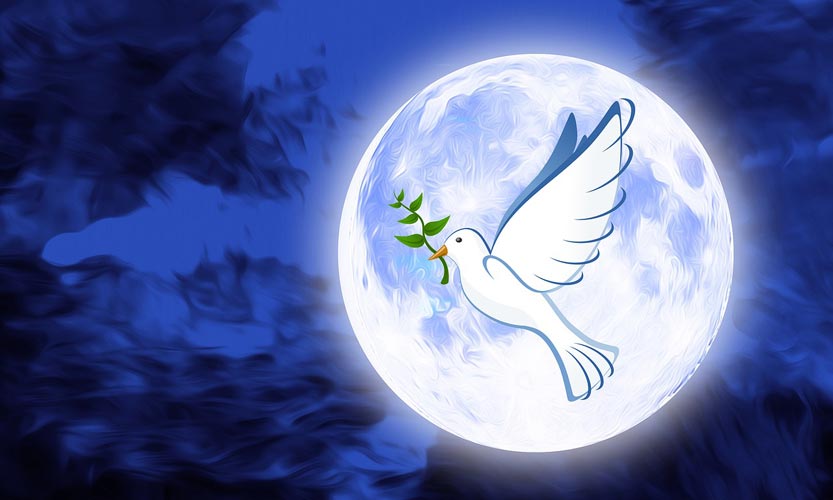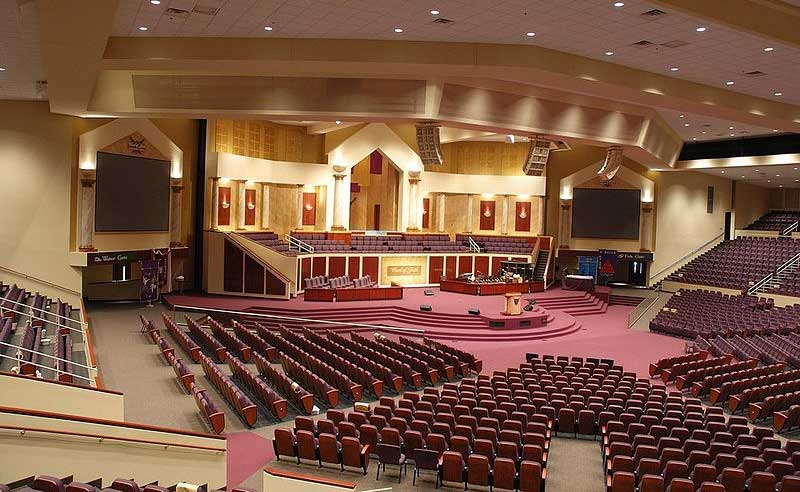Freedom Of Religion
Freedom of religion or religious liberty is a principle that supports the freedom of an individual or community, in public or private, to manifest religion or belief in teaching, practice, worship, and observance. It also includes the freedom to change one’s religion or beliefs,” the right not to profess any religion or belief” or “not to practice a religion”.
Freedom of religion is considered by many people and most nations to be a fundamental human right. In a country with a state religion, freedom of religion is generally considered to mean that the government permits religious practices of other sects besides the state religion, and does not persecute believers in other faiths. Freedom of belief is different. It allows the right to believe what a person, group, or religion wishes, but it does not necessarily allow the right to practice the religion or belief openly and outwardly in a public manner, a central facet of religious freedom.
It is a fact, that 95% of all people on this planet, embrace and believe in the religion that they were raised in. Since when is that a “personal choice” since it was jammed into their young minds by the adults in their lives.
Suppose, that instead of parents raising their children in the religion “of the parents”, that all children were taught about all religions. That way, they could then make an intelligent choice of their own, instead of being forced to believe what their parents made them believe. The world right now faces destruction because of the conflicts between the Christian, Muslim, and Jewish religions all over this world. Children are being taught to fear, hate, distrust, and sometimes kill people who do not believe the way they believe.

Freedom of Religion? Freedom of Choice? By Guy David Uriel:
The term “freedom of religion” (or “freedom of belief,” as Wikipedia puts it) is a principle that supports the right of an individual or community, in public or private, to manifest religious beliefs through teaching practices, worship, and observances. We also have the freedom to leave or discontinue membership in a religion or religious group if we so choose. I’m blessed to live in the United States, where we’re protected by laws that allow us to exercise our own faith as we see fit; where freedom of religion is commingled with and inseparable from freedom of speech. But exactly how free are we in truly expressing our choice of religion?
Of course, many places in the world do not have any freedom of religion, but for this article, I would like to concentrate specifically on developed Western nations. A common practice in places like the U.S. is to create the illusion of such freedom while simultaneously infringing on the rights of the children to truly engage in religious choice. While it may sound unusual to speak of children having freedom of choice, the minimum age is not referenced by our Constitution in our right to freely exercise religious beliefs.
I recently attended a teacher-parent conference at my son’s school where I learned of a new initiative to develop each child’s ability to think for themselves. Naturally, I agreed with this premise. Rather than just pushing them all in the same direction, such an initiative (if properly executed) will allow them to free their mind at an early age. After all, most of us want our children to become leaders rather than followers, right? Thinkers rather than button-pushers?
Have you ever asked your child what she wants to be when she grows up? Of course, you have. You want your child to express her own uniqueness, set career goals, and achieve them in any way possible. And you will provide her the freedom to choose how she goes about these things. You will do all that it takes to open her mind to the myriad of possibilities out there, but for some reason, you will not do the same with religion. No, this is where you draw the line. This is where you’ll repeat what was once done to you. This is where freedom of choice ends. You see, the freedom to choose a religion is not for your kids.
One day while driving to dinner, I overheard my eight-year-old son and his friend in the back seat arguing about the existence of the devil. While my son took a position against it, his friend insisted that the devil is in fact real. Finally, they both decided to ask me for clarification on whether the devil exists. Now my disbelief in the devil’s existence is no secret to those who know me, but I also don’t believe it’s proper for me to influence my son’s friend in the absence of his parents. So instead, I asked how it is that either of them can know whether the devil truly exists or not, to which my son’s friend replied that his parents had told him so. My son didn’t comment further, but I knew at the time I must have affected him through the years. After all, he is my son and is going to be prone to my beliefs.
A child’s brain development is most critical between birth and age three, and it is in those years, most of the information he receives becomes embedded in his mind. During this time, any religious teachings by his parents will permeate his psyche, ultimately leading to mental rigidity, single-mindedness, and feelings of guilt if he one day seeks to change those beliefs. I know it first hand, as I overcame my own religious upbringing. But even after the knowledge I received from my spirit guides, I still found myself fighting to clear away the guilt of disappointing my parents.
I know it’s impossible for most parents to even entertain the notion of giving their young children the freedom to choose their own religious beliefs. However, those who question their faith later in life but can’t escape the ensuing guilt know that it is possible to shed beliefs instilled in us from birth. You can empty your mind, start fresh and be guilt-free.
I wonder what would happen if all we knew was what our parents told us, which was what our grandparents told them, and so on. Where would this world be if not for innovation? Look at a scientist, any scientist, who has excelled in his field. At some point, he needed to shed everything he thought he knew to gain new paths of knowledge and subsequently rewrite the science books. His newfound knowledge aided in bettering humanity. Similarly, religion must evolve or our spirituality will suffer.
The spirits’ message of open-mindedness must remain constant. To keep an open mind, we must empty all of the information we were force-fed as children. But why must we do so? Because religion has stagnated in its evolution, closed its doors on innovation. Religion will not give our children the freedom to think for themselves. In fact, it’ll do just the opposite. So if religion won’t evolve organically, we must consciously do it instead. We must reshape the next generation, even with the disapproval of our parents, to help our children evolve spiritually.
I’m a Pathian; therefore, I’ll allow my son to question my way. I’ll allow him the freedom to decide whichever path he wants to walk, even if it’s in contrast to my beliefs. I’ll always teach him to respect all religions, regardless of his personal opinion of them. Now it’s time for you to ask yourself, “Can I do the same? Can I keep an open mind? Can I love my kids unconditionally, regardless of which path they pick? Can I provide them the path of their choosing, guilt-free?” It’s time to level the playing field. It’s time to shift our focus to the evolution of our spirituality. It’s time to exercise true freedom of religion.
Written in the Spirit of The Path.
Have you ever asked yourself what life is all about? Why are we here? For many years, humankind has searched for the answer. And for a good part of our evolution, we were on the right track. But our impulses eventually diverted us from our true nature and into a world of fantasies that robbed us from spiritually progressing. We forgot what life was all about.
The Path is not a new spiritual way. It’s not a new discovery. In fact, it’s as old as creation itself. It’s the true way for humans to continue evolving.
For thousands of years, people have lived their lives fearing what lies beyond death. They fear God. Not from experience, but because of written words they believe are derived from God Himself. The people behind those words have abused their power in the name of God, bestowing fear while simultaneously restricting their followers’ evolution.
Freedom From Religion? By Anagarika Eddie:
Once the Buddha was asked if anyone can become enlightened, even if they were not a follower of the Buddha. His answer – a resounding; “Of course!”
He even went further than that. He warned about becoming attached to the religion itself and suggested that one only use Buddhism as a raft to cross over from delusion to enlightenment. Then, just as one who has crossed a river in a raft gets out of the raft on the far shore and leaves it behind, so an enlightened person should do the same with Buddhism. He wasn’t trying to build a religion, he was trying to free people.
He did have one caveat to these statements, however.
What faith or religion one belongs to, or no religion or faith doesn’t matter. But something else does. And without this something else, which has no relationship to any particular beliefs or non-beliefs, enlightenment is not possible.
So what could this be, this universal requirement for enlightenment; this applicable-to-all proposition that can free humankind?
The Buddha said that eight things must be understood for enlightenment to happen, regardless of or in addition to one’s beliefs, and if even one of these eight things is missing, enlightenment will not occur.
These eight things, he said, could even be broken down into three things: Morality, self-introspection, and the wisdom or insight that results in spiritual transcendence.
It wouldn’t matter what deity one believed in or what path one followed, as long as that path led to a moral character and pure, innocent, and honorable actions. Then the mind would have no regrets and worries, and without regrets and worries, it could relax into calm and peaceful states that would in turn cut through our devious illusions and foster a pearl of true wisdom and insight that would transcend the mind itself and enter truly spiritual ineffable realms. What good are beliefs and ideals if the end product is clinging to beliefs and ideals to the point of excluding or disliking others?
One thing the Buddha was good at was explaining things clearly, not couched in mystery so that they could easily be understood. Therefore he explained in detail what these eight steps are, involving morality, self-introspection, and the resulting insight and wisdom.
The first step is balanced understanding. This means that we understand the reality of life; that it consists more or less of endless attempts for happiness by way of endless attempts to escape our discontent. That we are driven to this goal, and that this constant pressure to be happy equates to stress. And being thus driven, we sometimes harm others in the relentless pursuit of our own happiness, never coming to terms with happiness’s unreliability and transience.
The second step is balanced thought. This means cultivating thoughts of goodwill, an absence of cruelty, and disconnect from blinding greed and hatred. This also means dedicating one’s life to perfecting one’s character and spirituality even over one’s social status or material wealth.
The third step is balanced speech. This entails an awareness of how we speak to others, from outright lying to subtle harm where we might talk behind another’s back, slander someone unfairly, pass on hearsay as if we knew it to be our own truthful facts, gossip, use harsh speech where we might swear or exaggerate to make up for our insecurities in expressing ourselves, and even frivolous speech which is speech merely to keep each other entertained.
The fourth step is balanced action. This means cultivating calm and guiltless mental states by not harming others, including any living beings that treasure their life as much as we do and protect themselves from death. This also includes not harming one’s established sexual relationship by greedily involving oneself with another. With stealing, and with involving oneself with intoxicants or illicit drugs.
The fifth step is a balanced livelihood. This means making a non-harmful living free of deceit, underhandedness, unfairness, human slavery and prostitution, dealing in weapons, dealing in intoxicants, butchery, poisons, and dealing in profit made from profit.
The sixth step is balanced effort. Here we encourage positive mind states to arise within us such as loving-kindness, compassion, equanimity, and sympathetic joy. We discourage harmful mind states to arise such as greed, hatred, and delusion. We further cultivate positive mind states that have already arisen in us to grow and weed out harmful states that are still with us.
The seventh step is balanced mindfulness. Here we embark upon the true spiritual aspects of religion by contemplating what exactly we are regarding our bodies and minds, and whether or not ego is a reality or a delusion. This results in wisdom and insight into life. We actively investigate our feelings, our body, our consciousness, and the reality or the truths of life as we experience it.
The eighth step is balanced concentration. This is the crux of practice; meditation frees the mind from its illusions and pain and enables us to see all of the seventh above steps of balanced mindfulness clearly.
The above is just a thumbnail sketch of Buddhist practice, a practice that for over 2600 years has produced many enlightened individuals. But regardless of whether one becomes fully enlightened or not, the first day that one puts these practices into sincere action is the day that their entire life begins to turn around.
World Religions
Read also:
Faith Cometh By Hearing | How to Increase Your Faith
Hope And Faith | Can You Have Hope Without Faith?
The Religions of the World Collapse into Chaos as Truth Revealed
Jehovah’s Witness Religion | Founder, Enter Adventism, Exit Adventists
Secular Humanism | What is The Concept of Secular Humanism &More
Bible Verses About Faith | Scriptures for Difficult Times and Trust in Hard



